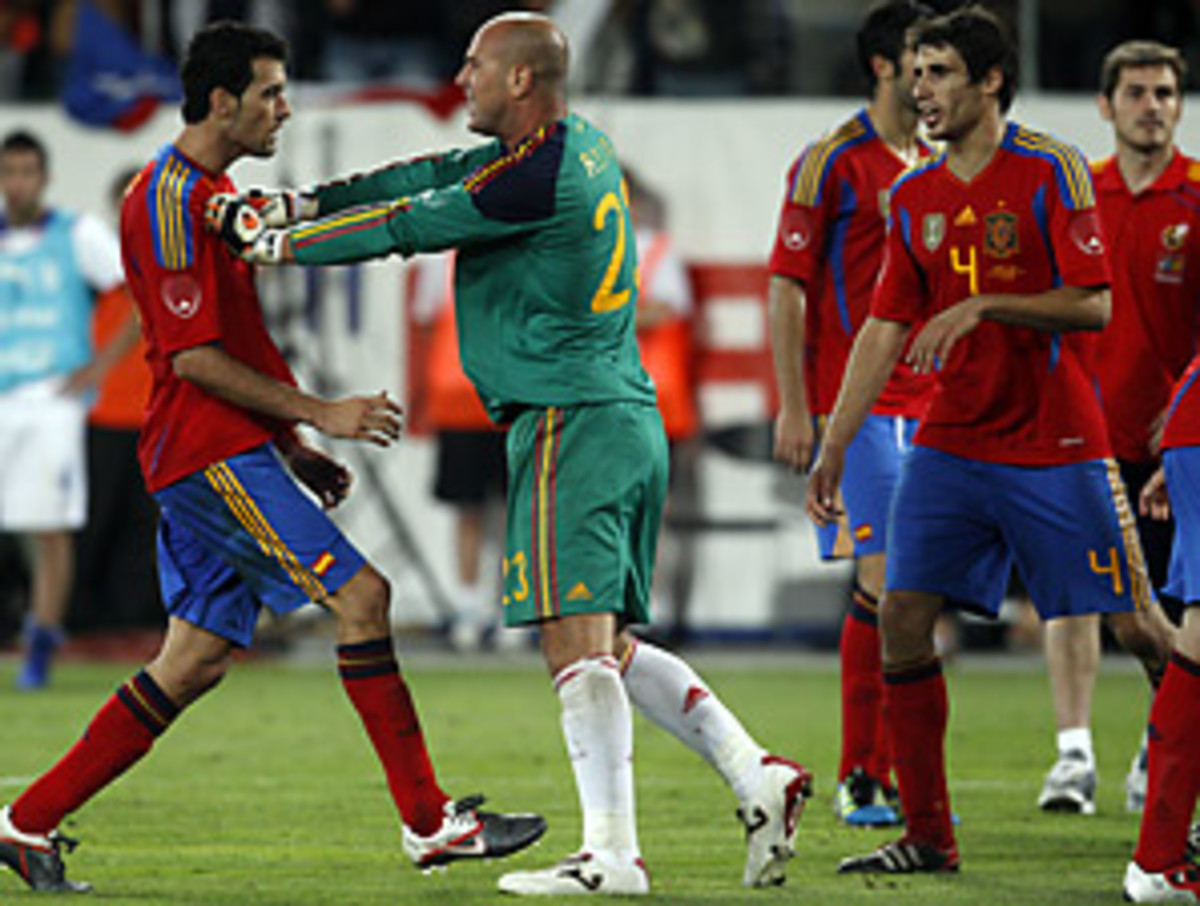Brawl helps heal Spain squad's rifts
Peace came via a punch up. Spain came from two goals down to win 3-2 against Chile on Sept. 2, Cesc Fàbregas scored twice to make it five goals in four matches, and Andres Iniesta was so good that one newspaper gave him four marks out of three, the Chile coach saying: "he destroyed us." But that was not the best thing that happened. The best thing that happened was a fight.
Yes, a fight. A set-to involving footballers from both sides as players piled in and squared up to one another. An ugly scene that was treated as if it was the most beautiful of sights. Marca might have called it an "unacceptable end to the match," and coach Vicente del Bosque told his players that he did not like what he had seen, but most loved it. And the reason was simple: this time it was the opposition they were fighting, not themselves.
One conclusion was that certain players can be counted to be first on the scene when there was trouble; others preferred to conclude that Spain had become brothers in arms.
It all started with Andres Iniesta, confronted by a furious opponent. Álvaro Arbeloa came to his rescue. Then Sergio Busquets came to his. And then Pedro piled in. Soon Sergio Ramos was on the scene. And Fàbregas. "So what?," you might say. Here's what: it all started with Barcelona's Andres Iniesta. Real Madrid's Álvaro Arbeloa came to his rescue, then Barcelona's Sergio Busquets came to his. Barcelona's Pedro and Madrid's Sergio Ramos were on the scene too.
After all the talk of division in the Spain squad -- first treated on these pages back in April and growing ever more concerning since -- here at last was a glimpse of togetherness among Spain's embattled and embittered players, of them all being in it together. They were at last fighting for a common cause not in some bloody internecine war.
The cover of the sports newspaper AS called it the "tangana de la reconciliación" -- the scuffle of reconciliation. Its editorial noted: "the family that fights together, stays together. They were united by their colors, pride in being world champions and the satisfaction of a comeback against a great team. The conclusion is simple: there is no problem, La Roja remains alive."
The country's other leading newspaper, Marca led on "Una piña." Literally a pineapple, it means a tightly bound ground, a closed circle, the closest of friends. Underneath, it ran: "A shameful scuffle blows away any doubts about the unity of the national team: Madrid and Barcelona players defended each other like brothers."
That might have been pushing it, but it was, in a perverse sort of way, another encouraging sign after a week in which Real's Iker Casillas had telephoned Barcelona rivals and Spain teammates Carles Puyol and Xavi Hernandez to try to put an end to the incessant bad feeling provoked by the Barcelona-Madrid conflict lest it affect Spain. Perhaps not so much because it helped to unite the players -- although at least momentarily it did, and many a relationship has been forged in battle -- but because it may have gone some way to relativize the clashes during last season's ugly clásico series and this season's Super Copa, showing that perhaps the conflict did not mean so much after all.
It might also have helped those players see that even those who like each other can fight each other; even those that do not like each other can fight with each other. That in the end they are only defending the interests of their team -- and that they have two teams, not just one club. Perhaps this can show how easily scuffles can start, reinforcing to players that in the heat of the moment, things are said and done that are not meant. Looking back, perhaps they will think that the same thing happened during the clásicos -- no point brooding on it now. Forget it and move on.
Perhaps. But there is a flaw in that belief. The trouble is that the conflict between Madrid and Barcelona went deeper than that -- and so did the rift. There was a reason why players were so irritated with each other, a reason why the rift was so serious. The players did not see the conflict as the consequence of a momentary loss of sanity, or madness in the heat of battle, but the consequence of a conscious policy willingly pursued. Of irreconcilable differences. The reason some Barcelona players were not especially upset with Sergio Ramos, for example, is that frankly they did not expect any different from him; the reason they were so upset with Iker Casillas and Xabi Alonso was because they did.
Those players, the ones really hurt, the ones that really mattered, were among those not involved in the call to arms. They had, though, been involved in the call. On Tuesday night Spain qualified for the European championships but many thought they had taken a more important step five days earlier. After the game Xavi, who had watched the scuffle from the bench, said: "see, didn't I tell you there were no problems?" He was joking but many wanted to believe that many a true word is said in jest.
Peace was secured -- by force of arms.






